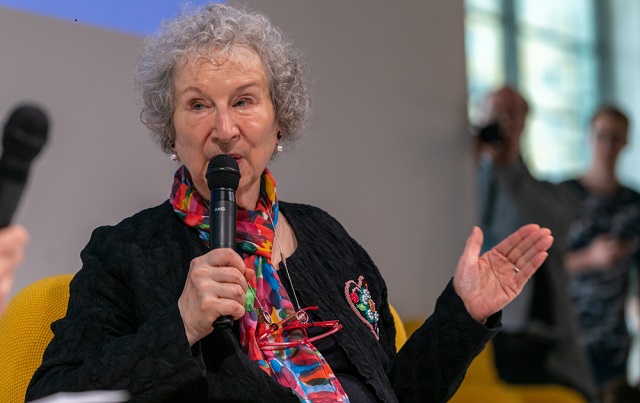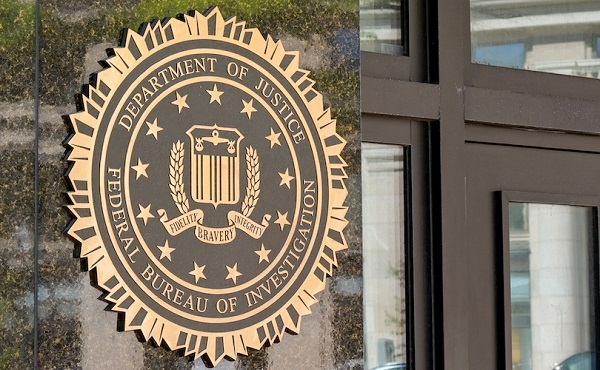Censorship Industrial Complex
Margaret Atwood compares Trudeau’s proposed Online Harms Act to Orwell’s ‘1984’

From LifeSiteNews
According to the proposed legislation, the bill would not only punish those who committed a “hate crime” but also those suspected of committing one in the future.
Liberal Attorney General and Justice Minister Arif Virani defended the Online Harms bill after Canadian author Margaret Atwood compared it to George Orwell’s dystopian novel Nineteen Eighty-Four.
On March 12, Virani claimed Atwood, famous for writing The Handmaid’s Tale, misunderstood the Online Harms Act, after the left-leaning author warned it would punish Canadians for “thoughtcrime,” comparing the legislation to laws introduced by totalitarian regimes such as the corrupt French aristocracy and the Soviet Union.
“If this account of the bill is true, it’s Lettres de Cachet all over again,” Atwood wrote on X, formerly known as Twitter, referring to secret letters sent by the King of France authorizing citizens to be imprisoned without a trial.
“The possibilities for revenge false accusations + thoughtcrime stuff are sooo inviting!” she added sarcastically. “Trudeau’s Orwellian online harms bill.”
If this account of the bill is true, it’s Lettres de Cachet all over again. The possibilities for revenge false accusations + thoughtcrime stuff are sooo inviting! Trudeau’s Orwellian online harms bill https://t.co/GziivgfNGt
— Margaret E Atwood (@MargaretAtwood) March 9, 2024
Atwood’s comment came in response to an article by The Spectator which warned the bill could lead to “thought police” regulating Canadians similar to those in George Orwell’s dystopian novel Nineteen Eighty-Four.
The often-referenced book is a cautionary novel about a totalitarian socialist society which punished its citizens if they disagreed their government’s agenda even in their thoughts.
While Atwood is known to be left-leaning, this is not the first time she called out Prime Minister Justin Trudeau for restricting freedom of speech. In April 2023, Atwood cautioned against Trudeau’s internet censorship legislation Bill C-11, comparing it to censorship in the Soviet Union.
Following Atwood’s comments online, Virani quickly attempted to reassure Canadians that she had just misunderstood the legislation, explaining that the bill’s definition of “hate speech” does not include what is “awful but lawful.”
“It includes expressions of detestation and vilification. It does not include insults, offensive comments, or jokes that are not very polite,” said Virani at a press conference in Toronto.
“The idea that someone on their smartphone on an afternoon while they’re watching a football game, if they insult anyone … could be condemned in a court or caught by a peace bond is ridiculous, in my opinion,” he added.
However, Virani conveniently neglected to say what would be considered “hate speech,” especially considering the bill regulates “posting hate speech online” that is deemed “discriminatory” against a wide range of “protected” categories, notably gender, race and sexuality.
Bill C-63, introduced last week, will create the Online Harms Act and modify existing laws, amending the Criminal Code as well as the Canadian Human Rights Act, in what the Liberals claim will target certain cases of internet content removal, notably those involving child sexual abuse and pornography.
However, the bill also seeks to punish “hate speech” and increase punishments for existing hate propaganda offenses in a substantial manner.
Penalties for violations of the proposed law include $20,000 fines and jail time, including life in prison for what it deems the most serious offenses.
According to the proposed legislation, the bill would not only punish those who committed a “hate crime” but also those suspected of committing one in the future.
“A person may, with the Attorney General’s consent, lay an information before a provincial court judge if the person fears on reasonable grounds that another person will commit; (a)an offence under section 318 or any of subsections 319(1) to (2.1); or (b) an offence under section 320.1001,” the text of the bill reads.
Atwood is not alone in her concerns over the legislation. Increasingly, prominent Canadians and even Americans have begun commenting on Trudeau’s authoritarian rule over Canada, particularly his restricting of internet speech.
Earlier this week, tech mogul Elon Musk called the proposed legislation “insane” as the new law would “allow judges to hand down life sentences for ‘speech crimes.’”
In late February, prominent Canadian anti-woke psychologist Jordan Peterson warned the new bill would undoubtedly lead to his criminalization.
Similarly, a top constitutional lawyer warned LifeSiteNews that the legislation will allow a yet-to-be-formed digital safety commission to conduct “secret commission hearings” against those found to have violated the law, raising “serious concerns for the freedom of expression” of Canadians online.
Additionally, Campaign Life Coalition recently warned that Bill C-63 will stifle free speech and crush pro-life activism.
Censorship Industrial Complex
Global media alliance colluded with foreign nations to crush free speech in America: House report

From LifeSiteNews
By Dan Frieth
The now-defunct ad coalition GARM shared insider data and urged boycotts of Twitter to punish non-compliance with its ‘harmful content’ standards, a US House Judiciary report shows.
A new report from the U.S. House Judiciary Committee has shed light on what it describes as an alarming collaboration between powerful corporations and foreign governments aimed at suppressing lawful American speech.
The investigation focuses on the Global Alliance for Responsible Media (GARM), an initiative founded in 2019 by the World Federation of Advertisers (WFA), which the committee accuses of acting as a censorship cartel.
According to the report, GARM, whose members control about 90 percent of global advertising spending, exploited its market dominance to pressure platforms like Twitter (now X) into compliance with its restrictive content policies.
A copy of the report can be found HERE.
The committee highlighted how GARM sought to “effectively reduce the availability and monetization” of content it deemed harmful, regardless of public demand for free expression.
Documents obtained by the committee reveal direct coordination between GARM and foreign regulators, including the European Commission and Australia’s eSafety commissioner.
In one exchange, a European bureaucrat encouraged advertisers to leverage their influence to “push Twitter to deliver on GARM asks.”

Similarly, Australia’s eSafety Commissioner Julie Inman Grant praised GARM’s “significant collective power in helping to hold the platforms to account” and sought updates to “take into account in our engagement and regulatory decisions.”

Robert Rakowitz, GARM’s co-founder and initiative lead, expressed a chilling goal in private correspondence, stating that silencing President Donald Trump was his “main thing” and likening the president’s speech to a “contagion” he aimed to contain “to protect infection overall.”

The report outlines how GARM distributed previously unavailable non-public information about Twitter’s adherence to its standards, fully aware this would prompt advertisers to boycott the platform if it failed to conform. According to the House report, Rakowitz admitted that this information sharing was designed to encourage members not to advertise on Twitter.
He went as far as to draft statements urging GARM members to halt advertising on the platform, telling colleagues he had gone “as close as possible” to saying Twitter “is unsafe, cease and desist.”
Despite the widespread impact of GARM’s actions, including what the committee describes as coerced “concessions” from platforms, internal polling circulated within GARM showed that “66 percent of American consumers valued free expression over protection from harmful content.”
Still, GARM pressed ahead with efforts to “eliminate all categories of harmful content in the fastest possible timing,” ignoring consumer preferences.
Even after GARM dissolved in 2024 amid legal challenges, similar efforts persisted.
A new coalition led by Dentsu and The 614 Group briefly attempted to revive GARM’s mission before disbanding under scrutiny. Gerry D’Angelo, a former GARM leader, reflected on the initiative’s overreach, stating, “Did we go too far in those first rounds of exclusionary restrictions? I would say yes.”
The Judiciary Committee warns that despite GARM’s downfall, the threat of collusion to stifle free expression remains.
It pledged to continue oversight to defend “the fundamental principles” of the Constitution and ensure that markets, not coordinated censorship efforts, shape the flow of information in the digital age.
Reprinted with permission from Reclaim The Net.
Censorship Industrial Complex
FBI urged to release withheld records on Hunter Biden laptop, other ‘Twitter Files’

From LifeSiteNews
By Dan Frieth
Judicial Watch initiated the lawsuit in April 2023, targeting the DOJ, the Department of Homeland Security, and the Office of the Director of National Intelligence
A hearing took place Wednesday, before U.S. District Judge Sparkle L. Sooknanan, in a Freedom of Information Act (FOIA) lawsuit brought by Judicial Watch against the Department of Justice (DOJ).
The case seeks records related to the “Twitter Files,” particularly those involving Hunter Biden’s laptop and allegations of censorship.
The only matter still pending is the FBI’s withholding of records detailing two meetings between agency officials and Twitter representatives from the Biden administration.
Judicial Watch initiated the lawsuit in April 2023, targeting the DOJ, the Department of Homeland Security, and the Office of the Director of National Intelligence.
The legal action followed the FBI’s failure to respond to a December 2022 FOIA request for communications between FBI personnel and key Twitter figures, including Yoel Roth, Vijaya Gadde, and Jim Baker, from June 2020 to December 2022.
These individuals were involved in discussions about suppressing the New York Post’s Hunter Biden laptop story, as disclosed in journalist Matt Taibbi’s December 2022 “Twitter Files.”
Tom Fitton, president of Judicial Watch, expressed strong disappointment: “It is frustrating beyond belief for Judicial Watch to have to go to federal court for basic information on Biden’s abuse of the FBI, using Twitter to censor and monitor Americans.”
Through a mix of FOIA requests and legal action, Judicial Watch continues to document extensive censorship efforts that affected tens of millions of Americans.
In November 2024, it obtained DHS records showing a widespread campaign, by both government and private groups, to police and suppress social media posts concerning election fraud in 2020.
Additional records from June 2024, released through Judicial Watch litigation, revealed that just before and after the 2020 election, state officials flagged alleged misinformation and sent it to entities like the Center for Internet Security, CISA, and the Election Integrity Partnership (EIP), a DHS-backed nonprofit known for targeting online election discourse.
In December 2023, DHS documents exposed coordination between CISA and the EIP to conduct “real-time narrative tracking” on major social media platforms in the run-up to the 2020 vote.
Similar records surfaced in November 2023, showing EIP’s influence over platforms such as Google, Twitter, Facebook, TikTok, Pinterest, and Reddit to suppress “disinformation.”
Reprinted with permission from Reclaim The Net.
-

 COVID-192 days ago
COVID-192 days agoOntario man launches new challenge against province’s latest attempt to ban free expression on roadside billboards
-

 Energy2 days ago
Energy2 days agoThis Canada Day, Celebrate Energy Renewal
-

 COVID-1916 hours ago
COVID-1916 hours agoNew Peer-Reviewed Study Affirms COVID Vaccines Reduce Fertility
-

 Business12 hours ago
Business12 hours agoOttawa Funded the China Ferry Deal—Then Pretended to Oppose It
-

 Alberta2 days ago
Alberta2 days agoAlberta Next Takes A Look At Alberta Provincial Police Force
-

 Alberta2 days ago
Alberta2 days agoCanadian Oil Sands Production Expected to Reach All-time Highs this Year Despite Lower Oil Prices
-

 MAiD14 hours ago
MAiD14 hours agoCanada’s euthanasia regime is not health care, but a death machine for the unwanted
-

 International2 days ago
International2 days agoPresident Xi Skips Key Summit, Adding Fuel to Ebbing Power Theories





